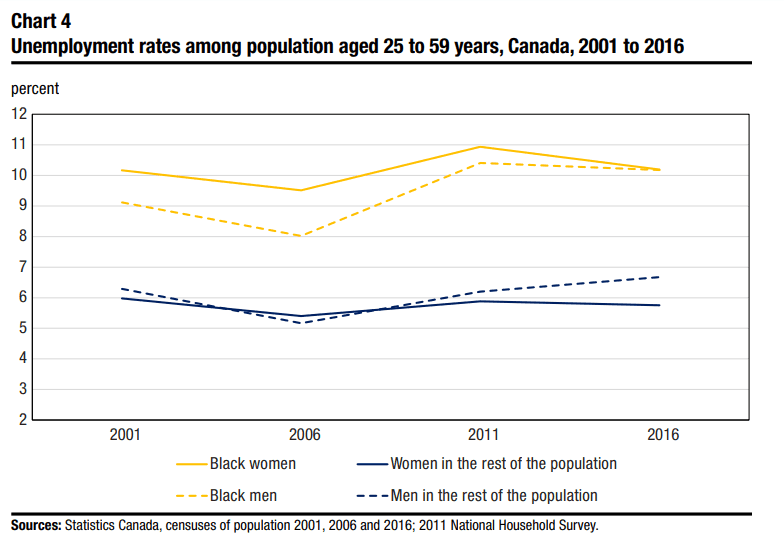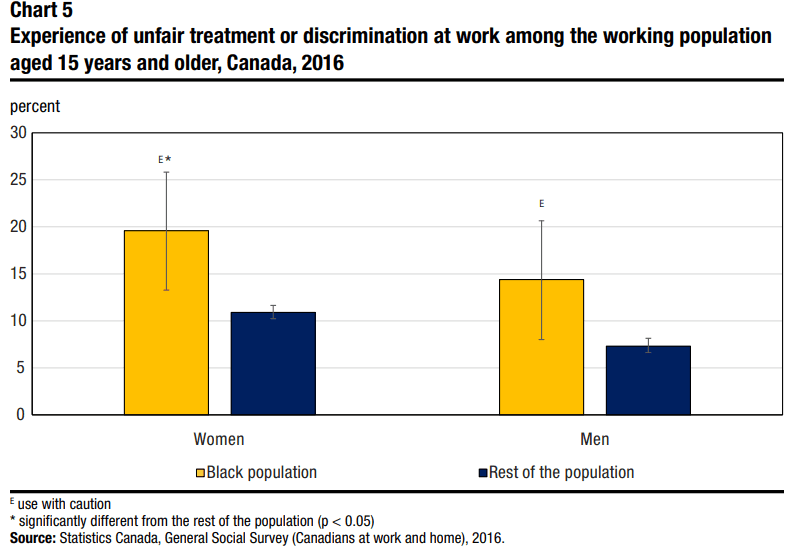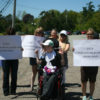KJIPUKTUK (Halifax) – A new booklet recently issued by Statistics Canada highlights the huge economic gap between Black people and the general population in terms of employment, income and child poverty.
The situation is bad in Canada, and, compared to other large cities, the situation is especially bad in Halifax.
See also: Census 2016: African Nova Scotian poverty rates through the roof, unemployment numbers terrible
Between 2001 and 2016 Canada-wide unemployment rates among the Black population were consistently higher than among the rest of the population.

In Halifax these numbers are worse than in the other 7 large Canadian cities included in the study. The unemployment rate for Black men in Halifax, at 14.1%, is two and a half times higher than that for men in the rest of the population (5.7%). For Black women in Halifax the unemployment rate is 11.2%, compared to 4.9% for the rest of the population.
The actual wage gap between Black people and the general population is substantial, with white men in Canada earning some $15,000 more than Black men. That gap widened substantially between 2001 and 2016.
Again, Halifax stands out in that in our city Black men earn on average almost $20,000 less than other residents. For Black women the gap is around $8,000.
Low wages, unemployment and child poverty go hand in hand.
In 2016, 21% of the Black population aged 25 to 59 lived in a low-income situation, compared with 12% of their counterparts in the rest of the population. 27% of Black children were living in a low-income situation, compared to 14% of children in the rest of the population.
Once again Halifax stands out negatively, with 38.5% of Black children living in a low income situation, compared to 15.9% of non-Black children.
Lately we hear a lot about anti-Black racism among police, manifesting as police violence and profiling. However, racism in hiring practices and in the workplace is also prominent, the Stats Canada survey suggests.
Black employees in Canada aged 15 or over, were more likely than their counterparts in the rest of the population to report having experienced unfair treatment or discrimination at work in the 12 months prior to the survey.

“In the Halifax North End inevitably the people’s number one concern is jobs, meaningful, well paying jobs. But to this day, there is not one organization that worries about jobs here in the North End,” Lynn Jones pointed out when I interviewed her in 2016.
Lately that may be changing, with some African Nova Scotians arguing that, with all the tax money pumped into infrastructure mega projects such as the Cogswell Interchange redesign, consideration should be given to hiring Black contractors and Black workers for components of these projects.
So far that idea is a hot potato that no politician wants to handle. Here is hoping that these politicians reconsider.
Given that the construction of the Cogswell Interchange caused the displacement of a poor and to a large extent Black community in the North End, hiring Black manpower would be a fitting gesture in the spirit of long overdue reparations.
With a special thanks to our generous donors who make publication of the Nova Scotia Advocate possible.
Subscribe to the Nova Scotia Advocate weekly digest and never miss an article again. It’s free!




Good points – riveting reading.
You’d think, or I’d strongly suspect, that there is an education gap as well that directly contributes to the income inequality.
You can’t force people into jobs they do not yet have the qualifications for. A strong initiative to remedy this should have education as its top priority. Not mentioning this leaves out half the picture which is likely also part of the solution.
This is all due to White Supremacy and Racism. There are plenty of decent hardworking blacks in Halifax and in Canada as well, but it’s ironic, people think Canada is free of racism but it’s not. The problem is that Canada has never had a Civil Rights Movement like we’ve had in America. Plus blacks in Canada don’t have the numbers that Black people have in America. Much of the American South and Northeastern Seaboard have huge black populations in the millions. We’ve got over 47+million people of African Descent in the United States which votes strong and consistently, has a a large economic base, large education base, and is highly resourceful and resilient. Canada not so much. We’re 15% of the U.S. Population a and 3% of the Canadian Population. Our numbers in America give us a lot of leverage on all fronts and we got so many Civil Rights Organizations and Professional and Business Networks which is able to provide a lot of push back against outrageous discrimination against black people, but not in Canada. You can be a nobody in the dominant White Society, but be King or Queen in the black Community, especially if your a Civil Rights Attorney, Schoolteacher, Public Schools Administrator, Law Enforcement Officer, or in some form of service. But not in Canada. In Canada, blacks don’t have the same type of successful professional and business networks, The Historically Black Colleges and Universities, and the same economic clout that blacks have in America. They don’t. That’s why Blacks in Nova Scotia and The Somali Communities in Toronto and across Canada are catching HELL.